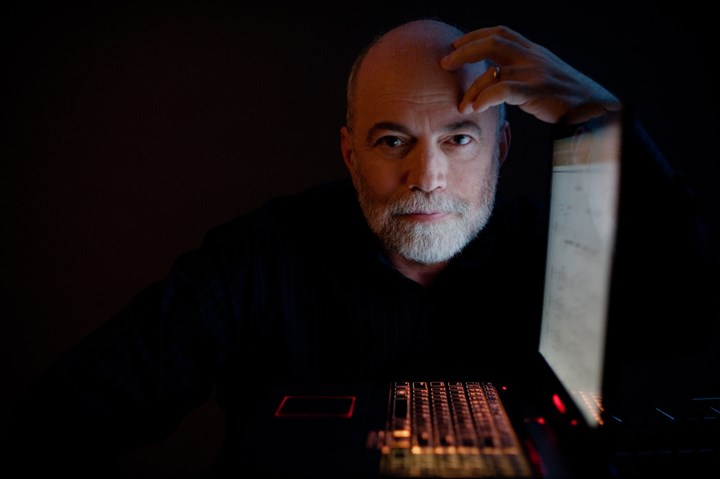
Bravo Niagara! Festival’s Sounds of Hope series wraps up Sunday, Dec. 13 with the world premiere of the new composition, Menorah by renowned multi-JUNO Award-winning Canadian composer Christos Hatzis.
It’s the third instalment in the latest addition to the Voices of Freedom Festival, part of a new initiative to commemorate the 75th anniversary of the end of the Holocaust. This event follows a Nov. 24 discussion between Dr. Robert Krell and Howard Reich called Holocaust Families: What We Learned from Eli Wiesel, moderated by Liberation 75’s Marilyn Sinclair, and the recent world premiere of Robi Botos: The Romani Experience, featuring the Hungarian-
Canadian jazz pianist.
Menorah will be performed by Montreal-based violinist Marc Djokic, a young dynamic presence in the violin world, and Christina Petrowska Quilico, an internationally renowned interpreter of contemporary music and recent appointee to the Order of Canada.
Hatzis informs The Local in an email that though he completed Menorah in December, 2019, his composition sheds light on current events. “In retrospect,” says the University of Toronto professor, “my written reflections turned out to be serendipitously prophetic, with the subsequent advent of COVID-19 and the continuing rise of authoritarianism in our world. The assaults on democracy around the world, in combination with political intolerance and systemic racism, make the comparison with the ominous last days of the Weimar Republic and the rise of Nazism unavoidable.”
The issue of human rights has been the focus of much of Hatzis’ work in the past. Born in Greece, he immigrated to Canada in 1982, becoming a Canadian citizen three years later. His compositions are known to be challenging, both to the musicians who play them and to the listeners who hear them.
“In my mind there is nothing worse than musically discussing human rights themes and allowing the listener to think of the music as entertainment, or to be disengaged from it,” he says. “I want to intellectually and emotionally assault the listener; make them think, but more importantly, make them feel; be inside the story and feel it as their own empathy.”
Menorah is a technically demanding composition for violin and piano, cast in two contrasting movements. Hatzis explains, “the first, Shabbat Blessing, (ברכת שבת) slightly prefigures the Holocaust. Even though there is no strict narrative, I envisioned a Jewish family somewhere in Europe feeling the ominous
rise of Nazism, but counting on the age-old tradition of the forefathers to protect them from the external danger; a combination of faith and rationalist denial.”
In that movement Hatzis points to a “Jewish” melody on the violin that struggles to hold things together. Austrian-born Jewish composer Arnold Schoenberg is an inspiration for the four-note motif on violin that ends the passage. Fittingly to the Holocaust theme, Schoenberg himself was a target for the Nazi regime.
Kaddish Yatom (קדיש יתום), the second movement, also envisions a family gathering, this one in the Warsaw Ghetto. “Here, the bonds of tradition are increasingly broken and giving away to nihilistic despair,” Hatzis outlines. “The previous “Jewish” violin melody has now become a falling two-note gesture against dissonant eruptions on both instruments. There are dissociated memories of better times, but they are brief and crashed by the reality outside and the noise-like outbreaks in the piano and violin.”
This movement actually quotes the overture from Richard Wagner’s Tristan and Isolde. The Bravo Niagara! composer-in-residence explains, “Wagner was an avowed anti-Semite, whose grandchildren and later descendants embraced Nazism, with one notable exception that I am aware of. Yet the music of this overture is about love and tragedy that stirs the deepest and noblest human emotions in the soul.” It stands in stark contrast to the anti-hierarchical technique of Schoenberg from the first movement.
Hatzis encourages the listener to ponder deeply about this contrast. “If, when hearing this section, you are drawn in by the beauty of Wagner’s music and feel alienated by the modernism of Schoenberg, think harder about who the perpetrator and the victim are in this unlikely musical conversation. Then think again about how systemic racism and antisemitism may reside within each one of us so deeply that sometimes it is impossible to deconstruct.”
Djokic and Petrowska Quilico, having both collaborated with Hatzis previously, are perfect musicians to take on this challenging work. Hatzis says Djokic possesses a deep knowledge of his music and the demands that it places on the performer. Petrowska Quilico, in turn, is a contemporary music virtuoso with great attention to detail and indomitable attitude toward the technical demands of contemporary music.
“Marc and Christina are fantastic human beings,” he adds, “who will never rest until they have exhausted every ounce of energy to make the notes on paper come alive and engage the listener.”
Many of Hatzis’ previous works have been combined with visual media. For the online premiere of this commissioned composition, Djokic and Petrowska Quilico are accompanied by fitting visual imagery.
“The stunning photographs from the Last Folio collection by Yuri Dojc (taken by the Canadian photographer at a Jewish village in Slovakia where time seemed to have stood still since 1943) and the restless camera work of Adrian Thiessen and the Foreground Media team make the perfect complement for this music. I am grateful to all the colleagues who took part in this project and especially to Bravo Niagara!”
The world premiere of Menorah is scheduled for Sunday, Dec. 13 at 2 p.m. Visit bravoniagara.org for more information.


